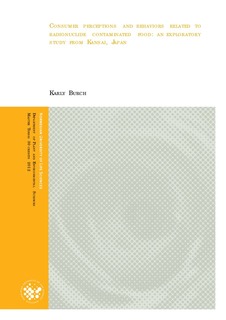| dc.description.abstract | The Fukushima Daiichi Nuclear Power Plant disasters were triggered by a magnitude 9.0 earthquake and subsequent tsunami on March 11, 2011, ultimately resulting in a large scale release of anthropogenic radionuclides into the environment. Since the disasters, the Japanese government has been trying to ease public worries about food safety; however, many concerned consumers feel that the government is creating policies and taking actions that do not address their underlying apprehensions. With the aim of gaining empirical insights into these concerns, this paper uses data from a survey of 111 consumers in the Kansai region of Japan,
located approximately 600 km from the disasters, to explore consumer perceptions and behaviors related to the risk of consuming radionuclide contaminated food. The results of the study reveal three consumer profiles present in the region in the aftermath of the nuclear disasters: the active concerned consumer, the passive concerned consumer, and the young consumer. Women with children living in their homes were the dominant demographic in the most concerned consumer profiles, and consumer concerns related to radionuclide contaminated food were found to be complex and multidimensional, associated with health and human illness, the environment, future generations, the economy, societal wellbeing and self image. Results indicated that all groups tend to lack trust in the national government as an information source and actor to ensure food contains safe levels of radionuclides, putting more trust in independent sources and food system actors in close proximity to consumers (city/local government; citizens groups; themselves) or to food sources (farmers). While all groups felt that food from south-western Japan was safest for consumption, the active concerned consumers were the only ones who were very active in changing their eating habits. In addition, the nationwide project to dispose of disaster debris produced in the March 11th earthquake and tsunami—
possibly contaminated with radionuclides and other pollutants—stands out as a major threat to food safety in the minds of the active and passive concerned citizens, provoking a collective political response from many of the active concerned consumers who feel the project threatens their ability to choose ‘safe‘ foods. | no_NO |
